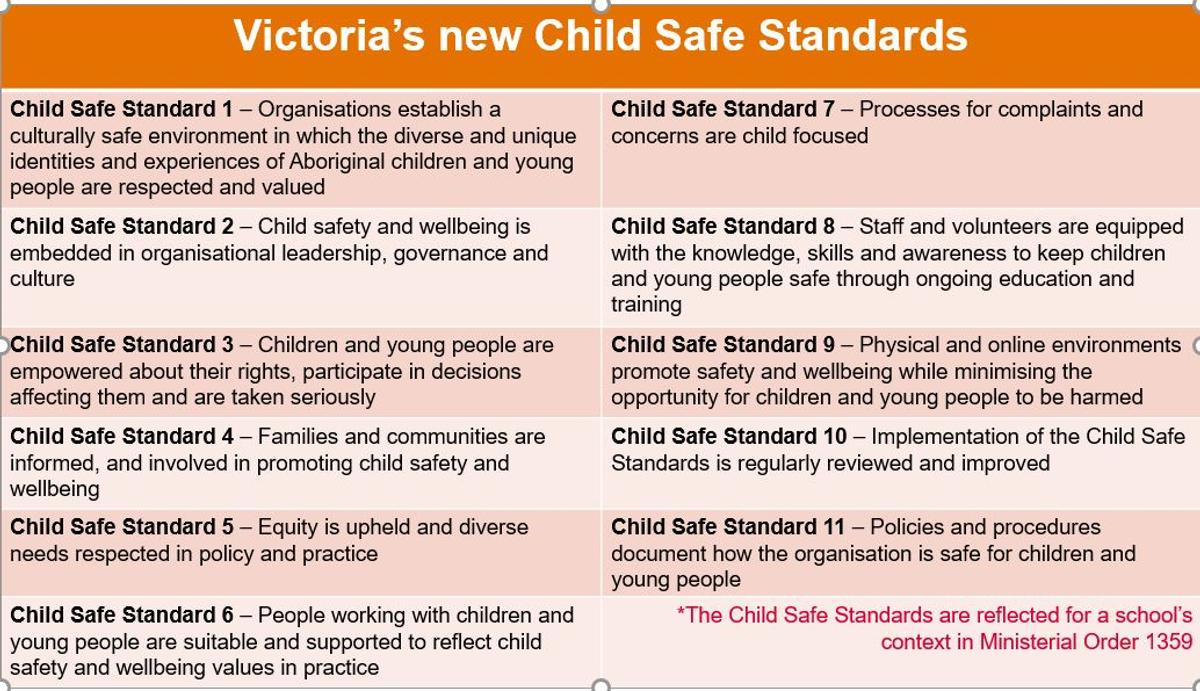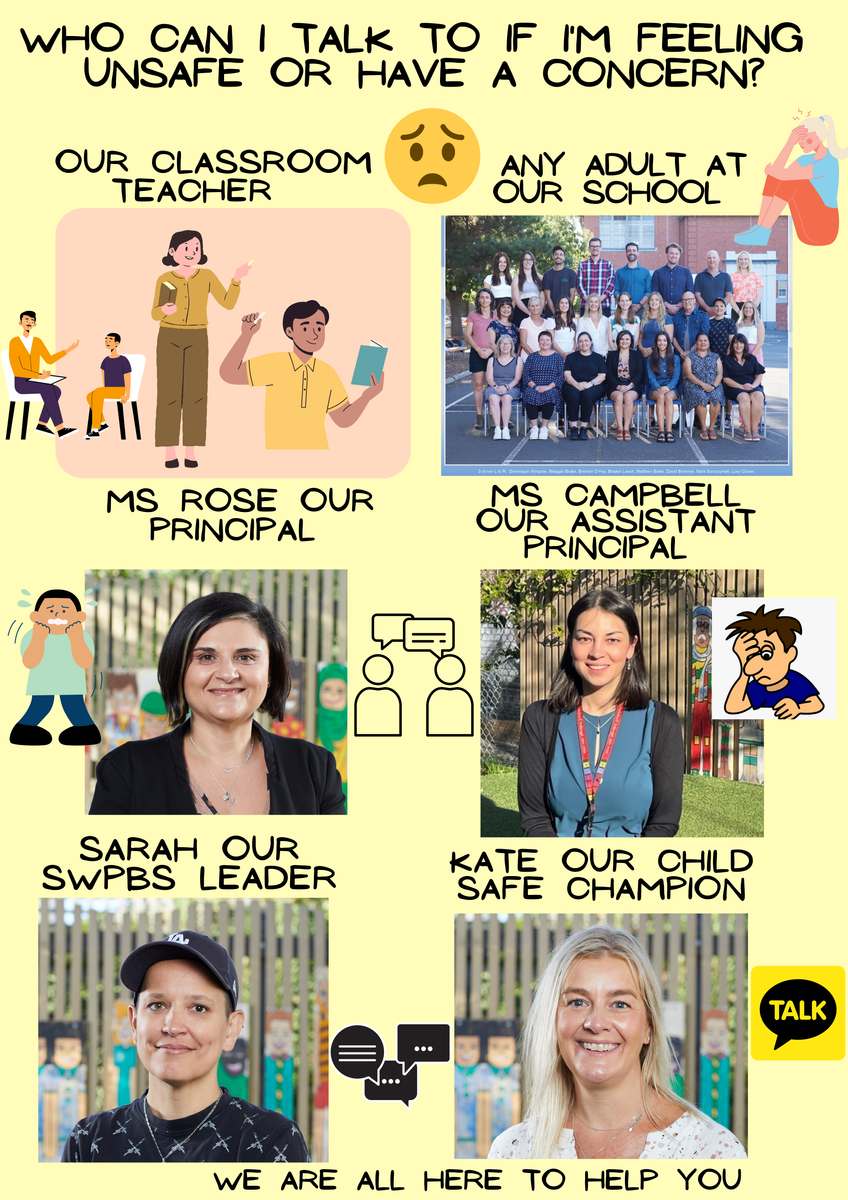CHILD SAFE STANDARD 7
Processes for complaints and concerns are child-focused.
In complying with Child Safe Standard 7:
Our school has policies, procedures and practices to:
- have a complaints-handling process focused on students and their safety needs
- take complaints and concerns seriously
- respond promptly and thoroughly
- identify and respond to all forms of child abuse
- report child abuse to relevant authorities, whether or not there is a legal obligation to report it.
Our school has an accessible, child-focused complaint-handling policy which clearly outlines the roles and responsibilities of leadership, staff and volunteers, approaches to dealing with different types of complaints, breaches of relevant policies or the Code of Conduct and obligations to act and report.
https://www.ripponleaps.vic.edu.au/source/RPS%20Child%20Safety%20Code%20of%20Conduct%202022-2023.pdf
Effective complaint-handling processes are understood by children and young people, families, staff and volunteers, and are culturally safe.
https://www.ripponleaps.vic.edu.au/source/Child%20Safety%20Responding%20and%20Reporting%20Obligations%20Policy%20and%20Procedures%20%20(1).pdf
Complaints are taken seriously and responded to promptly and thoroughly.
Our school has policies and procedures in place that address reporting of complaints and concerns to relevant authorities, whether or not the law requires reporting, and co-operates with law enforcement.
Our reporting, privacy and employment law obligations are always met.
Our complaints processes to be child-centred and empowering:
- We encourage students to raise concerns with a trusted adult if anything makes them feel uncomfortable or unsafe. A special flyer exists across the school with our child-safe champions and whom students can approach if they are worried about anything.
-
- We facilitate student discussions about what would help them speak up when they have concerns.
-
- We ask students about their experiences making complaints and act on feedback from students in our policies and the complaints process.
-
- We make sure it is easy for students, families, staff and volunteers to access and understand the complaints process. Our school's Complaints Policy is on the school's website, and we make physical copies available from the school and include information about how to make a complaint in the school welcome pack.
-
- We include information to students and their families about:
-
- -how to make a complaint
- -what to expect the school to do when responding to a complaint
- -how the school will support complainants.
-
- We support students to develop the skills to make complaints and raise concerns by implementing the whole school approach to Respectful Relationships and using teaching and learning materials like the Resilience Rights and Respectful Relationships materials.
-
- We let students know that they can make a complaint about any kind of harm, perpetrated at school, outside school, by an adult or by other children, including bullying or cyberbullying and all forms of abuse.
-
- We advertise assistance and support services for students, families, staff and volunteers who wish to raise concerns, including the availability of translating and interpreting services.
-
- We receive complaints thoughtfully, taking care to validate students' experiences – what may seem small to an adult might not be to a child.
-
- We ensure complaint handling systems and processes are confidential, and that only authorised staff can access complaint records.
-
- We commit to making improvements following a complaint to address the source of the problem and follow through on the commitment.
-
- We provide feedback mechanisms that allow for anonymity, such as secure suggestion boxes. Regularly review and action the suggestions received.
We are transparent and open about the steps in the complaints process by:
- Naming multiple people or positions that students and families can approach to raise concerns.
-
- This includes Our teachers, wellbeing leaders, Assistant Principal and Principal.
-
- Being transparent and open about the steps in the complaints process.
-
- Letting students know that they can bring a support person of their choice to any interviews or meetings related to the complaint.
-
- Explaining what happens next and check that complainants understand the proposed action.
-
- Ensuring that students understand who will be told about their complaints.
-
- Reporting back to complainants to close the loop, where appropriate.
-
- Offering counselling or support services to complainants as appropriate.
-
- Referring to the National Office for Child Safety Complaint Handling Guide for processes.
We are transparent and open about procedures for responding to child abuse by:
We support staff and volunteers to participate in building a child-focused environment by:
- Outlining the responsibilities school leaders have to act on complaints and concerns related to child safety and wellbeing, including the responsibilities of the child safety champions.
-
- Nominated staff should have:
- - a detailed understanding of the complaints process
- - investigative or interviewing skills, or authorisation to engage people with these skills
- -high levels of rapport and engagement with students
- -ability to respond to students with diverse needs
- -willingness to work with police and child protection authorities
- -information on support services for people affected by complaints.
-
- Ensuring that child safe supervision and people management practices are implemented during and following a complaint or concern relating to the conduct of a staff member (refer to Standard 6).
-
- Training staff and volunteers to recognise the different ways students express concerns or distress, such as changing their behaviours or demeanour.
-
- Encouraging staff to maintain an approachable, professional standard to help students feel confident and supported to raise issues at any time.
-
- Ensuring staff and volunteers understand the complaints policy, the Four Critical Actions, failure to report and failure to protect offences, grooming, child abuse and family violence, mandatory reporting and their roles in the process.
-
- Empowering all staff and volunteers to act on concerns about behaviour and report their concerns, complaints or breaches of the Child Safety Code of Conduct to school leadership or the regional office.
-
- Making sure that the school meets all recordkeeping, information sharing, privacy and employment law obligations.
-
- Encouraging staff and volunteers to contribute to the development and review of complaints policies and processes.










